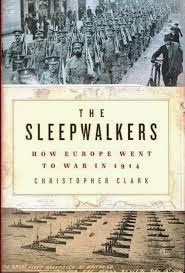This is a real classic and a book that we decided to read in one of my reading groups. It was totally different from what I thought it would be. I thought it would be heavy, tragic and with horrible details of the times at the front. It is horrible of course but told in an easy and accessible prose. It is told in first person singular with the voice of nineteen year old Paul Bräumer, a soldier at the Western front during the first world war.
We follow Paul from the first staggering steps as a new soldier into the more routine soldier who has been there and seen it all. It is told in a matter-of-fact way that makes you feel you are standing beside him and experience all the things he experiences. That is probably also why you can identify with him. You follow him in school with his friends who also enrol. During the initial training which does not prepare them for what they are about to experience. Through the bullies who think the most important thing is the drill and who punish the boys for stupid things. The first experience of the fighting, the dirt, the lice, the lack of food and hygiene. On his first leave when he goes back to his family and friends and does not really have anything to speak to them about. They would not understand how it is so it is better not to say anything. Being injured and seeing fellow soldiers getting legs amputated or dying. The old world is not there anymore and how is it possible to go on living a life after the experiences of the trenches? How can you go back to your old life? You did not really have a life yet being only nineteens years old!
Nowadays we would no longer have any real links with the way we used to be. it wasn't the awareness of how beautiful it was that meant so much to us, or of how good the atmosphere was, but the feeling of community, the way we all felt a kinship with the objects and events of our existence. That's what set us apart and made our parents' world a little difficult for us to understand; because somehow we were always gently bound up with that world, submissive to it all, and the smallest thing led us onwards along the parth of eternity. Perhaps it was just the privilege of our youth - we were not yet able to see any restrictions, and we could not admit to ourselves that things would ever come to an end; expectation was in our blood, and this meant that we were at one with our lives as the days went by.
One of his friends always eat something quickly when he know an enemy attach is coming up because he doesn't know if he will eat again. Another friend says that since you have to reckon with a stomach wound you should have as little as possible in your belly. To this Paul Bräumer philosophises:
Things like that are problems for us, we take them seriously, and we couldn't do otherwise. Life here on the very edges of death follows a terribly clear line, it restricts itself to what is absolutely necessary, everything else is part of a dull sleep - it is our crudeness but also our salvation. If we were to make finer distinctions we would long since have gone mad, deserted or been killed. It is like a Polar expedition - every activity is geared exclusively to survival, and is automatically directed to that end. Nothing else is permissible, because it would use us energy unnecessarily. That is the only way we can save ourselves, and I often look at myself and see a stranger, when in quiet hours the puzzling reflection of earlier times places the outlines of my present existence outside me, like a dull mirror image; and then I am amazed at how that nameless active fore that we call life has adapted itself to all this.
Wars are always terrible things, this we know. But it is only when we read something like
All Quiet on the Western Front or Sebastian Barry's
A Long Long Way on Irishmen fighting on the British side on the Western front that we can really feel the horrors of war. It does not matter which side you are on; it is terrible.
The book is very well translated by Brian Murdoch. In the afterword he says:
For the later generations, the novel has lost none of its power. It presents within a small space a surprisingly broad picture of a modern, mechanised war, and whether or not some subsequent wars have been justified (or have been at least explicable), this war is understood by no one
A book that is widely talked about for the time being and that has got ravishing reviews is
The Sleepwalkers by Christopher Clark. It is an account on the causes of the first world war. It promises to be as exciting as any thriller and I will be back with a review later on.








Comments
Post a Comment